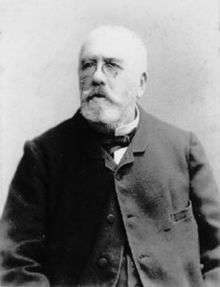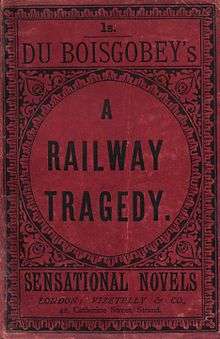Fortuné du Boisgobey
| Fortuné du Boisgobey | |
|---|---|
 Fortuné du Boisgobey | |
| Born |
Fortuné Hippolyte Auguste Castille 11 September 1821 Granville, France |
| Died |
26 February 1891 (age 69) Paris, France |
| Occupation | Novelist |
| Nationality | French |
| Genre | Crime fiction, Detective fiction, Historical fiction, Sensation novel |
| Notable works | The Convict Colonel, The Chevalier Casse-Cou, The Old Age of Monsieur Lecoq, An Omnibus Mystery,The Severed Hand |
Fortuné Hippolyte Auguste Abraham-Dubois (11 September 1821 – 26 February 1891), under the nom de plume Fortuné du Boisgobey, was a French novelist.
Life
Fortuné du Boisgobey was born at Granville (Manche), and graduated from the Lycée Saint-Louis.[1] He served as paymaster to the Army of Africa through several campaigns in Algeria from 1844 to 1848.[2] His parents were wealthy, yet at forty or upwards, he took to writing.[1]
In 1843, using the name Fortuné Abraham-Dubois, he made his literary debut in the Journal d'Avranches with a series entitled Lettres de Sicile recounting a voyage he had taken the year before.[3] His first successful novel, Les Deux comédiens appeared in 1868, under the du Boisgobey pen name in the Petit Journal.[4] The story was popular, and M. Paul Dalloz of the Petit Moniteur signed a contract with the author for seven years at 12,000ƒ a year.[1] His reputation was increased by the publication of Une Affaire mystérieuse and Le Forçat colonel, both published there in 1869.[4] In 1877, Figaro engaged him for a series of novels, which increased the success of that paper.[1] He was prolific, with more than sixty works to his name, and became one of the most popular feuilleton writers. [2] In 1885 and 1886 he was President of the Committee of the Société des gens de lettres.[4] Du Boisgobey died in 1891 after a long illness.
Works

Du Boisgobey was the chief of the followers of Émile Gaboriau, with whom his name is generally associated.[4] He even wrote a sequel, La Vieillesse de M. Lecoq, using Gaboriau's character Monsieur Lecoq in 1877-78.[5] His novels deal with crime, the police, and Parisian life. They had a high circulation, and the greater part of them have been translated into English.
English translations exist for the following works.
- Le Forçat colonel (1871) - The Convict Colonel on the Internet Archive
- Le Chevalier Casse-Cou (1873) - The Chevalier Casse-Cou / The Red Camelia at Google Books
- Le Camélia rouge - The Red Camelia
- La Chasse aux ancêtres - The Search for Ancestors
- Le Vrai Masque de fer (1873) - The Iron Mask
- L’As de cœur (1875) - The Ace of Hearts on the Internet Archive
- La Tresse blonde (1875) - The Golden Tress at Google Books
- Le Coup de pouce (1875) - The Thumb Stroke on the Internet Archive
- Les Mystères du nouveau Paris (1876) - The Mysteries of New Paris
- L'Enragé (1876) - Marie-Rose; or, The Mystery
- "La Jambe Noire" (1877) - The Phantom Leg on the Internet Archive
- Une Affaire mystérieuse (1878) - The Nameless Man at Google Books
- La Vieillesse de M. Lecoq (1878) - The Old Age of Lecoq, the Detective at Google Books
- Première partie - The Old Age of Monsieur Lecoq
- Deuxième partie - The Nabob of Bahour
- L'Épingle rose (1879) - The Coral Pin at Google Books
- Première partie - The Coral Pin
- Deuxième partie - The Temple of Death
- L'Héritage de Jean Tourniol (1879) - The Robbery of the Orphans; or, Jean Tourniol's Inheritance
- Le Crime de l'Opéra ou "La Rideau Sanglante" (1879) - The Crime of the Opera House / The Opera-House Tragedy
- Vol. 1 on the Internet Archive
- Vol. 2 on the Internet Archive
- La Main coupée (1880) - The Lost Casket at Google Books / The Severed Hand
- Première partie - The Countess Yalta; or, The Nihilist Spy
- Deuxième partie - Doctor Villagos; or, The Nihilist Chief
- Où est Zénobie? (1880) - Where's Zenobia? / Zénobie Capitaine
- L'Affaire Matapan (1881) - The Matapan Affair / The Matapan Jewels
- L'Équipage du diable (1881) - The Day of Reckoning / Satan's Coach
- Le Crime de l'omnibus (1881) - An Omnibus Mystery / The Crime in the Omnibus
- Le Pavé de Paris (1881) - A Mystery Still on the Internet Archive
- Les Deux bonnets verts (1881) - Cécile's Fortune at Google Books / Mérindol
- Le Pignon maudit (1882) - A Fight For A Fortune on the Internet Archive / The Privateersman's Legacy
- Le Bac (1882) - Who Died Last? or, The Rightful Heir at Google Books / Was it a Murder? or, Who is the Heir? / The Ferry-Boat / Article 722; or, Roger's Inheritance
- Les Suites d'un duel (1882) - The Results of a Duel on the Internet Archive
- La Revanche de Fernande (1882) - Fernande's Choice on the Internet Archive
- Le Cochon d'or (1882) - The Golden Pig; or, The Idol of Modern Paris at Google Books
- Bouche cousue (1883) - Sealed Lips
- Le Collier d'acier (1883) - The Steel Necklace at Google Books
- Le Coup d'œil de M. Piédouche (1883) - The Detective's Eye at Google Books / The Parisian Detective / Piedouche, a French Detective
- Le Billet rouge (1884) - The Red Lottery Ticket at Google Books / Lover or Blackmailer?
- Le Mari de la diva (1884) - The Prima Donna's Husband
- Le Secret de Berthe (1884) - Bertha's Secret on the Internet Archive
- Première partie - Bertha's Secret
- Deuxième partie - The Countess de Marcenac
- Babiole (1884) - Pretty Babiole / Babiole, the Pretty Milliner on the Internet Archive
- Margot la Balafrée (1884) - In the Serpent's Coils at Google Books / The Vitriol Thrower
- Première partie - The Sculptor's Daughter
- Deuxième partie - The Count's Ring
- La Voilette bleue (1885) - The Angel of the Chimes on the Internet Archive / The Angel of the Belfry / The Blue Veil; or, The Crime of the Tower
- Le Cri du sang (1885) - The Cry of Blood on the Internet Archive
- Le Pouce crochu (1885) - Thieving Fingers at Google Books / Zig-Zag the Clown; or, The Steel Gauntlets
- La Belle geôlière (1885) - The Jailor's Pretty Wife on the Internet Archive
- La Bande rouge (1886) - The Red Band; or, The Siege and the Commune at Google Books
- Première partie - The Red Band
- Deuxième partie - Scarlet Mystery / The Mystery of the Oak
- Porte close (1886) - The Condemned Door; or, The Secret of Trigavou Castle on the Internet Archive / The Closed Door
- Rubis sur l'ongle (1886) - Cash on Delivery: A Novel of Love and the Passion for Gaming on the Internet Archive
- Cœur volant (1886) - Fickle Heart! a Novel of Love and Racing on the Internet Archive
- "A Railway Tragedy" (1887) on the Internet Archive
- "Le Gredins" (1887)
- Jean Coup-en-deux (1887) - Death or Dishonor
- L'Héritage d'un forçat (1887) - The Felon's Bequest on the Internet Archive
- L'Œil-de-chat (1888) - The Cat's-Eye Ring: A Secret of Paris Life
- Grippe-Soleil (1887) - The Bride of a Day: a Story of Paris Life
- Le Chalet des Pervenches (1888) - The Half-Sister's Secret
- Mariage d'inclination (1888) - Married for Love
- Décapitée! (1889) - The Severed Head; or, A Terrible Confession
- Le plongeur: scènes de la vie sportive (1889) - The High Roller; or, Plunging and Honeyfugling on the Race-Track: A Sporting Romance
- Fontenay Coup-d'Epée (1890) - Fontenay, the Swordsman at Google Books
- Un Cadet de Normandie au XVIIe siècle (1891) - An Ocean Knight; or, The Corsairs and their Conquerors
Notes
References
- "Notes". The Critic 15 (375): 131. 1891-03-07.
- Chevrier, Thierry (1997). "Dossier: Fortuné du Boisgobey" (in French). Le Rocambole 1 (1): 23-74. 0765-0507.
- Moon, George Washington (1891). Men and Women of the Time. London: George Routledge and Sons. pp. 278.
- Lai, Rick (2004). "THE MONSIEUR LECOQ CHRONOLOGY". "THE MONSIEUR LECOQ CHRONOLOGY". Retrieved 2010-06-19.
-
 Chisholm, Hugh, ed. (1911). "Boisgobey, Fortuné du". Encyclopædia Britannica (11th ed.). Cambridge University Press.
Chisholm, Hugh, ed. (1911). "Boisgobey, Fortuné du". Encyclopædia Britannica (11th ed.). Cambridge University Press.
External links
- Works by Fortuné Du Boisgobey at Project Gutenberg
- Works by or about Fortuné du Boisgobey at Internet Archive